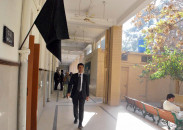Will CIE lose its edge?
Admits paper leaks, urges students to stay focused as investigations continue

Once regarded as a gold standard in academic assessment, Cambridge International Education (CIE) is now facing increasing scrutiny in Pakistan. Following a recent shift that allowed private schools to independently conduct O and A Level examinations - previously handled solely by the British Council - reports of paper leaks, and lack of accountability have cast a shadow over the system. Stakeholders are questioning whether the integrity and global standing of Cambridge qualifications in Pakistan are being compromised.
Until just two years ago, the British Council was the sole authority overseeing these exams in Pakistan. Now, over 20 private schools in Karachi and Islamabad are conducting the exams themselves. This decentralisation has raised serious concerns about transparency and security. Reports of exam paper leaks are on the rise, causing distress among thousands of students and their parents.
Recently, an AS-level Physics paper was reportedly leaked and widely circulated on social media before the scheduled exam. Similar claims have emerged regarding other subjects. As more schools gain the authority to conduct exams independently, the risk of compromised exam integrity appears to grow proportionally.
Cambridge International has acknowledged some of the leaks in a public Facebook statement, urging students to stay focused and promising investigations. However, the lack of transparency around these investigations - particularly the absence of shared findings or any disclosed disciplinary actions - has left stakeholders dissatisfied and concerned. Parents and students fear that ineffective preventive measures could lead to more leaks in the future.
The decision to let private schools conduct exams reportedly stemmed from a former official at the Federal Ministry of Education. However, the ministry now appears to be powerless in addressing the fallout, including the ongoing paper leak scandal.
While CIE administers the General Certificate of Education (GCE) O and A Levels in Pakistan, it's worth noting that these programmes were phased out in the UK in 1986 and have not been part of the official education system there for nearly four decades.
Another point of contention is the continued use of the outdated alphabetical grading system (A* to E), as opposed to the numerical system (1 to 9) now standard in the UK. Some education experts argue that this inconsistency places Pakistani students at a disadvantage when competing globally for academic and professional opportunities.
Pakistani parents spend an estimated Rs 30 billion annually on Cambridge exams. When papers are leaked and exams are not rescheduled, students are often graded based on predicted scores instead of their actual performance - undermining the entire purpose of standardised assessment.
As a result, Cambridge is not only losing its academic superiority in Pakistan but also facing growing criticism from students who feel that the organisation's standards are now limited to curriculum design. With exam execution resembling local board practices, the credibility and perceived value of Cambridge qualifications in Pakistan is diminishing.
When contacted by The Express Tribune, a Cambridge spokesperson said, "Cambridge has strict security protocols in place to safeguard exam materials, and these protocols apply equally to our partner institutions and schools." In response to questions about the outdated O-level system, the spokesperson added, "The qualification is internationally recognised and accepted by leading universities worldwide. The exams offer students an opportunity to demonstrate their knowledge and skills through written, oral, and practical assessments."
Regarding the paper leaks, the spokesperson said: "We conduct prompt and thorough investigations into all evidence to ensure fairness in results. However, we can not comment on specific allegations during the exam period in order to keep students focused on their exams."



















COMMENTS
Comments are moderated and generally will be posted if they are on-topic and not abusive.
For more information, please see our Comments FAQ